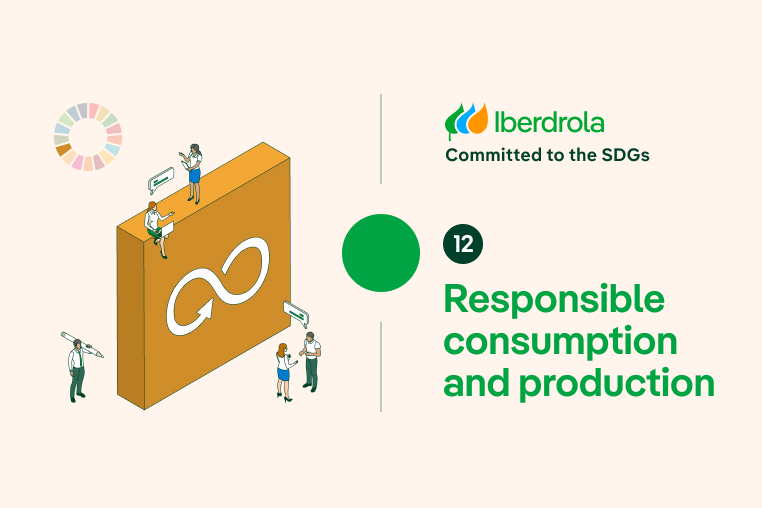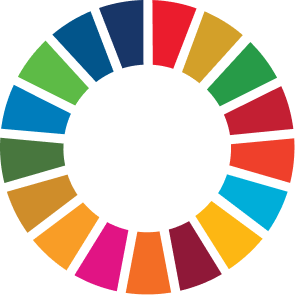SDG 12: Responsible consumption and production
We support local and sustainable energy sources
Economy Business Energy efficiency SDG
At Iberdrola we are committed to local energy sources and purchases from local suppliers. In addition, the group is a pioneer in sustainable event management and promotes the implementation of electric vehicles through its Sustainable Mobility Plan.
Goal 12: Responsible consumption and production. Video voice transcription (Spanish version) [PDF]
Our contribution to SDG 12: Responsible consumption and production
![]() 87.1 % of purchases made in 2022 were from local suppliers.
87.1 % of purchases made in 2022 were from local suppliers.
![]() More than 77% of the Group's main suppliers already had sustainability policies in place by the end of 2022, exceeding the commitment to reach 75% by 2025.
More than 77% of the Group's main suppliers already had sustainability policies in place by the end of 2022, exceeding the commitment to reach 75% by 2025.
![]() 50.5 % of Iberdrola's energy production uses local energy sources available in the actual country where the electricity is generated.
50.5 % of Iberdrola's energy production uses local energy sources available in the actual country where the electricity is generated.
![]() Iberdrola was the first company to certify the sustainable management of its three main corporate events with AENOR under the same management system: ISO 20121 certification. The General Shareholders' Meeting has been certified since 2016 and its Results Presentations and Capital Markets & ESG Day have been certified since 2022.
Iberdrola was the first company to certify the sustainable management of its three main corporate events with AENOR under the same management system: ISO 20121 certification. The General Shareholders' Meeting has been certified since 2016 and its Results Presentations and Capital Markets & ESG Day have been certified since 2022.
![]() Sustainable Mobility Plan to facilitate the implementation and extension of electric vehicles thanks to the development of policies and specific actions to mobilise all the actors involved: administration, companies, car manufacturers, etc.
Sustainable Mobility Plan to facilitate the implementation and extension of electric vehicles thanks to the development of policies and specific actions to mobilise all the actors involved: administration, companies, car manufacturers, etc.
![]() In 2022, Iberdrola approved its Circular Economy Plan 2030, which defines different objectives aligned with its sustainable energy model and the principles of the circular economy.
In 2022, Iberdrola approved its Circular Economy Plan 2030, which defines different objectives aligned with its sustainable energy model and the principles of the circular economy.
What is Sustainable Development Goal 12: Responsible consumption and production?
Sustainable Development Goal 12 aims to change the current model of production and consumption to ensure responsible and efficient consumption of natural resources and sustainable means of production.
Why is it so important to achieve SDG 12: Responsible consumption and production?
Unfortunately, progress is accompanied by environmental degradation that is endangering the planet's survival. Global consumption and production depend on the use of natural resources, so they need to be used in an efficient way.
According to UN data, national material consumption (NMUC), which measures the amount of materials extracted directly to meet a country's final consumption demand, is growing steadily, leaving a global material footprint of 95.9 billion metric tons in 2019.
Almost a third of all food produced in the world - some 1.3 billion tonnes per year - ends up in the rubbish bin, either because it is not consumed or because it spoils due to poor transport and collection practices. The food sector also consumes around 30% of the world's energy and is responsible for one third of total greenhouse gas emissions.
Domestic and commercial electricity consumption is the second fastest growing area of energy use in recent years, after transport. At the same time, fossil fuel subsidies - which create distortions in energy markets and hinder the transition to cleaner and more sustainable alternatives - have re-emerged in recent years following the challenges imposed by first the COVID pandemic and then the global energy crisis triggered by the Russian invasion of Ukraine.
If the pace of growth continues, three planets will be needed to provide the natural resources necessary to maintain today's lifestyles in 2050, it is expected that there will be 9.6 billion inhabitants on Earth. Responsible production and consumption can also contribute to alleviating inequalities and to a transition towards a green economy.
It is therefore necessary to promote global and urgent action to ensure sustainable consumption and production patterns. That is why the UN has established responsible production and consumption as SDG 12 of its 17 Sustainable Development Goals, adopted in September 2015 as part of Agenda 2030.
SDG 12 targets: Responsible consumption and production
The specific targets set for 2030 are:
-
To reduce food waste by half in retail sales and in production and supply chains.
-
To reduce the generation of waste through activities of prevention, reduction, recycling and reuse.
-
To achieve sustainable management and efficient use of natural resources.
-
To achieve environmentally sound management of chemicals and all wastes throughout their life cycle.
-
To promote sustainable public procurement practices.
-
To encourage companies, especially large ones, to adopt sustainable practices and incorporate sustainability information into their reporting cycle.
-
To assist developing countries in strengthening their scientific and technological capacity to move toward more sustainable consumption and production patterns.
-
To achieve sustainable tourism, which creates jobs and promotes local culture and products.
-
To rationalise fossil-fuel subsidies.
























